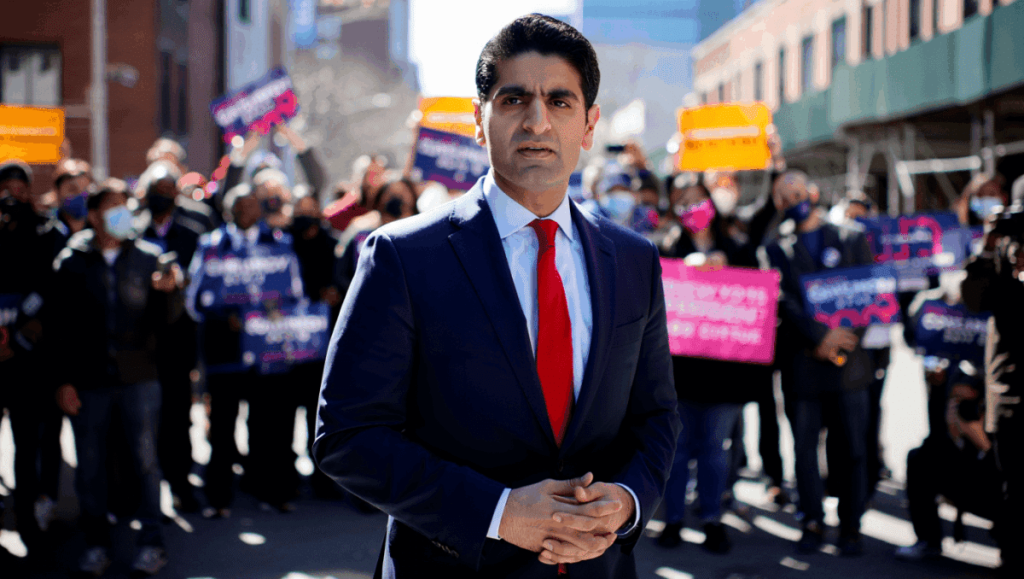Listen to the article
Zohran Mamdani has emerged as the most polarizing figure in the New York City mayoral race, attracting attention not just for his policy platform but for his provocative rhetoric and theatrical campaign style. The young, media-savvy progressive has become a lightning rod in city politics, with his candidacy serving as a referendum on the direction of Democratic politics in America’s largest city.
Mamdani’s campaign has repeatedly generated controversy, particularly around his comments touching on sensitive issues like 9/11. During an appearance at a Bronx Islamic community center, he recounted how a relative stopped riding the subway after the 2001 attacks because she felt unsafe wearing a hijab. This personal anecdote quickly transformed into a political firestorm.
Critics condemned the comparison as insensitive, arguing it inappropriately juxtaposed one person’s discomfort with the tragedy of mass casualties. Supporters countered that Mamdani was highlighting legitimate concerns about Islamophobia faced by Muslim New Yorkers in the aftermath of the attacks. The incident underscores how personal narratives can become politically charged in today’s media environment.
The candidate has not shied away from wading into international issues. He has drawn explicit connections between U.S. policing practices and Israeli military operations, comments that many interpreted as blaming Israel for alleged police brutality in New York. These statements have alienated moderate Democrats and pro-Israel constituencies while energizing his progressive base, particularly those advocating for Palestinian causes.
Mamdani’s campaign has skillfully leveraged social media to build support among younger voters. His team produces polished, shareable content that blends earnest policy discussions with irreverent cultural references. This digital-first approach has translated into grassroots enthusiasm among voters who primarily engage with politics online.
His policy platform includes several ambitious proposals that appeal to the progressive left but raise practical concerns among centrists and fiscal conservatives. These include fare-free public transit, universal childcare, and strict rent control measures. While supporters argue these initiatives would make New York more equitable and affordable, critics question their fiscal viability and implementation challenges.
The candidate’s framing of issues has also drawn scrutiny. For instance, Mamdani has suggested that eliminating subway fares would reduce violence in the transit system, a causal claim that many urban policy experts consider oversimplified. This approach epitomizes a central tension in his campaign: are symbolic policy shifts sufficient to address complex social problems?
Despite positioning himself as a champion for working-class New Yorkers, Mamdani’s campaign team includes several staffers from privileged backgrounds with elite educations. This apparent contradiction has become ammunition for critics who question the authenticity of his populist message and suggest his insurgent campaign relies heavily on establishment resources and connections.
Mamdani faces a primary challenger with deep ties to traditional Democratic power structures. Though this opponent carries baggage from past scandals and policy failures, they represent the party’s institutional center. The contest has evolved into a generational and ideological battle that could signal broader shifts in Democratic politics nationwide.
The outcome will likely hinge on several key voting blocs: outer-borough blue-collar voters skeptical of progressive policies, young progressives energized by identity politics, moderate Democrats concerned about governance issues, and communities invested in the candidate’s positions on foreign policy matters, particularly regarding Israel and Palestine.
Political analysts note that while Mamdani’s social media presence generates headlines, the race will ultimately be decided by coalition-building and turnout across demographic lines. His candidacy has become a referendum not just on specific policies, but on the future direction of urban progressive politics in one of America’s most diverse and complex cities.
Verify This Yourself
Use these professional tools to fact-check and investigate claims independently
Reverse Image Search
Check if this image has been used elsewhere or in different contexts
Ask Our AI About This Claim
Get instant answers with web-powered AI analysis
Related Fact-Checks
See what other fact-checkers have said about similar claims
Want More Verification Tools?
Access our full suite of professional disinformation monitoring and investigation tools




10 Comments
The candidate’s comments have certainly stirred up controversy, but they also raise important questions about the lasting societal impacts of 9/11 and how different communities experienced its aftermath. This is a complex issue that deserves a nuanced discussion.
While the comparison may have been ill-advised, the candidate’s attempt to highlight the experiences of Muslim New Yorkers post-9/11 is understandable, even if the execution was clumsy.
This incident underscores the difficulty of discussing the impacts of major historical events, especially when they involve sensitive issues of identity and discrimination. The candidate’s remarks may have been clumsy, but the underlying concerns merit thoughtful examination.
Reasonable people can disagree on the appropriateness of the candidate’s framing, but the broader issue of post-9/11 Islamophobia deserves serious consideration.
This is a nuanced issue without easy answers. While the candidate’s comments may have been ill-advised, the underlying concerns about Islamophobia faced by Muslim New Yorkers post-9/11 are valid and deserve thoughtful discussion.
It’s a delicate balance to strike when addressing sensitive historical events and their societal impacts. Reasonable people can disagree on the appropriateness of specific rhetoric.
The candidate’s remarks highlight the challenges of navigating political discourse around 9/11 and its aftermath. While the comparison may have been poorly chosen, the broader issue of Islamophobia experienced by Muslim communities deserves serious consideration.
This is a complex topic without easy answers. It’s important to approach it with nuance and empathy, rather than reflexive condemnation or defense.
Interesting perspective on the complexities of how personal experiences can influence political narratives. This incident highlights the delicate balance between highlighting valid concerns and avoiding insensitive comparisons when discussing sensitive historical events.
I can see how the candidate’s comments could be interpreted as controversial, but it’s important to consider the broader context and intent behind them.